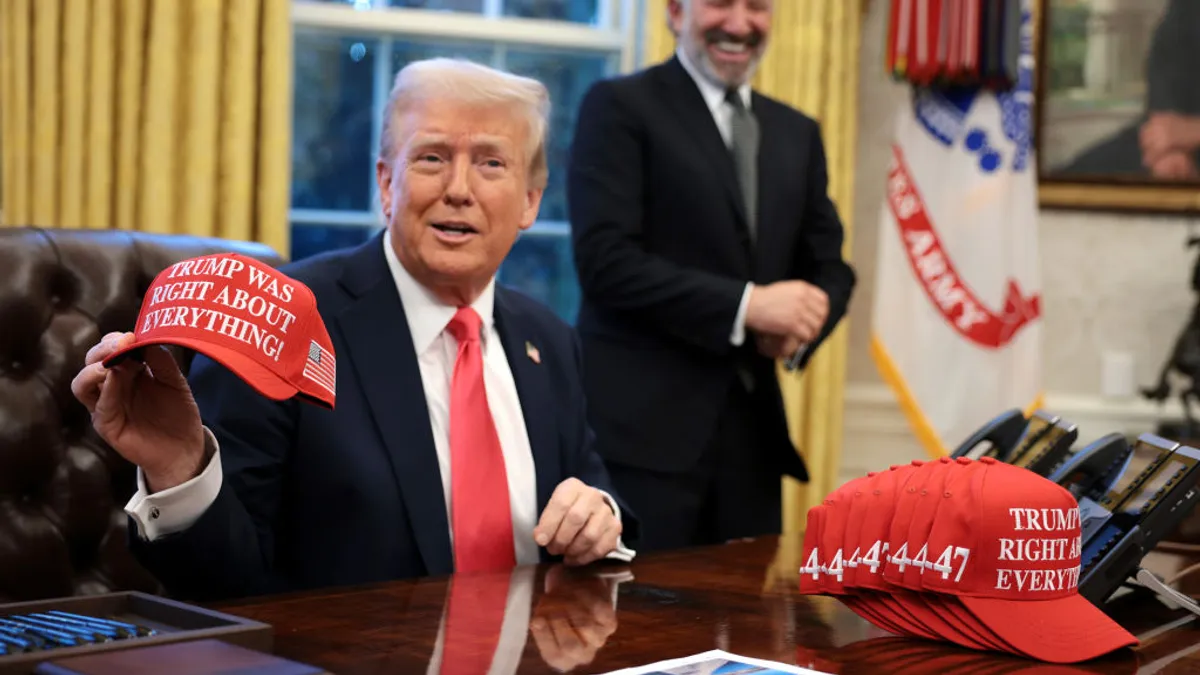Trump administration tariffs imposed on U.S. imports and reciprocal tariffs placed on American exports could hurt demand for Fiserv’s payment processing services, the company warned shareholders in its annual report for 2024 filed last week.
The company’s hardware — point-of-sale devices consumers use to pay at merchant counters — is largely manufactured overseas, the payments processing giant said Wednesday in the report filed with the Securities and Exchange Commission. That disclosure was part of the report’s section discussing global risk factors.
While the document doesn’t explicitly refer to the across-the-board tariffs President Donald Trump imposed on April 2, Fiserv’s hardware would almost certainly be subject to those tariffs. (The disclosures were the same those in the Milwaukee-based company’s 10-K filing in February.)
“The U.S. has imposed tariffs, and may impose new or increased tariffs on certain imports from other countries, which may lead to retaliatory tariffs imposed by other governments,” the filing says. “If the U.S. administration imposes new or increased tariffs, trade restrictions, or restrictions on the cross-border flow of data, our manufacturing of hardware devices, supply of raw materials and access to certain markets, could be impacted.”
The document does not say precisely where Fiserv’s point-of-sale devices are manufactured, but filings from last year said that at least some of those devices are made in China.
Fiserv CEO Frank Bisignano may join the Trump Administration. He was nominated to lead the Social Security Administration in December and testified during a Senate confirmation hearing last month. Senators have yet to vote on his nomination.
It wasn’t the first time Fiserv expressed concern over taxes on imports. The company’s annual report for 2023 filed last year singled out import taxes on Chinese goods as a global risk factor.
“Although it is difficult to predict how current or future tariffs on items imported from China or elsewhere will impact our business, the cost of our products manufactured in China and imported into the U.S. or other countries could increase, which in turn could adversely affect the demand for these products and have a material effect on our business and results of operations,” the company said in the filing last year.
The annual report filed with the SEC this year laid out broader concerns about the duties placed on foreign imports and possible retaliatory tariffs.
A Fiserv spokesperson did not respond to questions about the impact of tariffs and whether the company’s devices are still manufactured in China.
The 34% tariffs that China, the world’s second most populous country, will be subjected to beginning April 10 are higher than the baseline 10% import taxes announced Tuesday, and could rise. Trump on Monday threatened China with tariffs as high as 50% after the Chinese government responded to the U.S. action with its own 34% duty reciprocal taxes on American imports.
Although the document does not explain the mechanics of how tariffs would depress demand, the import taxes will raise the company’s costs, which would likely mean Fiserv would need to charge higher prices.
The point-of-sale devices referenced in the annual report include those made by Clover, a point-of-sale service that caters to small businesses. Fiserv has singled out the small-business-focused point of sale service as a key driver of growth.
The payments processing company expanded Clover’s services overseas recently, launching in Australia last month.











